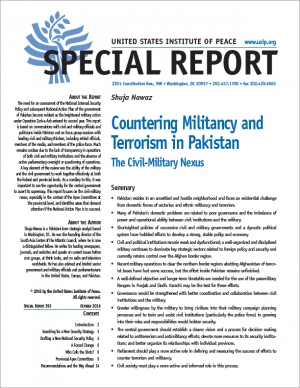Based on interviews with civil and military officials and politicians, this report details the poor governance and imbalance of power in Pakistan and offers key recommendations for the military, civilian institutions, parliament, and civil society to achieve the goals and objectives outlined in Pakistan’s National Action Plan (NAP). The need for an assessment of the National Internal Security Policy and subsequent NAP became evident as the heightened military action under Operation Zarb-e-Azb entered its second year. Much remains unclear due to the lack of transparency in operations of both civil and military institutions and the absence of active parliamentary oversight.
 Summary
Summary
- Pakistan resides in an unsettled and hostile neighborhood and faces an existential challenge from domestic forces of sectarian and ethnic militancy and terrorism.
- Many of Pakistan’s domestic problems are related to poor governance and the imbalance of power and operational ability between civil institutions and the military.
- Shortsighted policies of successive civil and military governments and a dynastic political system have hobbled efforts to develop a strong, stable polity and economy.
- Civil and political institutions remain weak and dysfunctional; a well-organized and disciplined military continues to dominate key strategic sectors related to foreign policy and security and currently retains control over the Afghan border region.
- Recent military operations to clear the northern border regions abutting Afghanistan of terrorist bases have had some success, but the effort inside Pakistan remains unfinished.
- A well-defined objective and longer-term timetable are needed for the use of the paramilitary Rangers in Punjab and Sindh. Karachi may be the test for these efforts.
- Governance would be strengthened with better coordination and collaboration between civil institutions and the military.
- Greater willingness by the military to bring civilians into their military campaign planning processes and to train and assist civil institutions (particularly the police force) in growing into their roles and responsibilities would bolster security.
- The central government should establish a clearer vision and a process for decision making related to antiterrorism and antimilitancy efforts; devote more resources to its security institutions; and better organize its relationships with individual provinces.
- Parliament should play a more active role in defining and measuring the success of efforts to counter terrorism and militancy.
- Civil society must play a more active and informed role in this process.
About the Report
The need for an assessment of the National Internal Security Policy and subsequent National Action Plan of the government of Pakistan became evident as the heightened military action under Operation Zarb-e-Azb entered its second year. This report is based on conversations with civil and military officials and politicians inside Pakistan and on focus group sessions with leading civil and military thinkers, including retired officials, members of the media, and members of the police force. Much remains unclear due to the lack of transparency in operations of both civil and military institutions and the absence of active parliamentary oversight or questioning of operations. A key element of the review was the ability of the military and the civil government to work together effectively at both the federal and provincial levels. As a corollary to this, it was important to see the opportunity for the central government to assert its supremacy. This report focuses on the civil-military nexus, especially in the context of the Apex Committees at the provincial level, and identifies areas that demand attention if the National Action Plan is to succeed.
About the Author
Shuja Nawaz is a Pakistani-born strategic analyst based in Washington, DC. He was the founding director of the South Asia Center of the Atlantic Council, where he is now a distinguished fellow. He writes for leading newspapers, journals, and websites and speaks on current issues before civic groups, at think tanks, and on radio and television worldwide. He has also advised and briefed senior government and military officials and parliamentarians in the United States, Europe, and Pakistan.